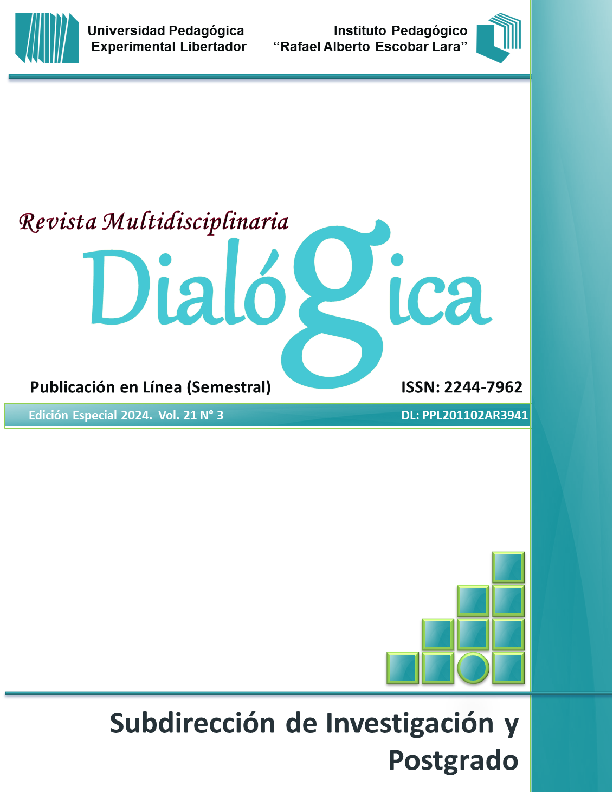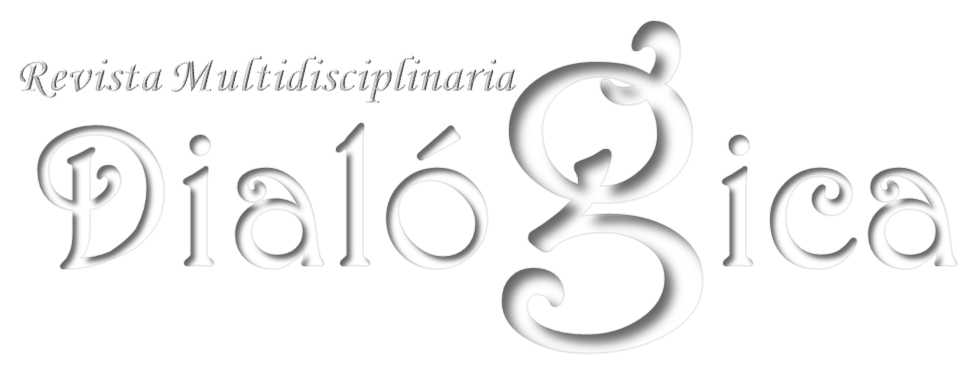RESOLUTION OF MATHEMATICAL PROBLEMS IN THE LEARNING OF NEGATIVE INTEGERS NUMBERS
DOI:
https://doi.org/10.56219/dialgica.v21i3.2774Keywords:
Problem solving, negative integers, pedagogical tasksAbstract
This research has the purpose of building a theoretical body regarding the learning process of negative integers through the resolution of mathematical problems in students at the secondary education level. The theory of didactic situations and didactic transposition will be used as a framework of reference. The research was developed from a qualitative approach using phenomenological and hermeneutic methods, in order to pay attention to the personal and experiential aspects of those who participate in the educational process contemplated therein. Among the results, it is expected to obtain the detail of the process that must be followed with the resolution of problems so that the learning of negative integers occurs, also to determine the perception that students have regarding the learning of negative integers, as well as such as the abilities or skills that they will show when they learn.
References
Ayllón, M. (2012). Invención-Resolución de problemas por alumnos de educación primaria [Tesis Doctoral, Universidad de Granada]. http://hdl.handle.net/10481/27771.
Baeza, M. (2015). Estudio comparativo de procesos de resolución de problemas y de juegos de estrategia en educación primaria [Tesis Doctoral, Universidad Autónoma de Barcelona]. https://ddd.uab.cat/record/176159.
Bagazgoitia, A. (2007). La Belleza en Matemáticas. Sigma, 31, 133-151.
Carrillo, F. (2003). Álgebra India. Apuntes de historia de las matemáticas, 20(1), 5-10.
Carrillo, J. (1996). Modos de resolver problemas y concepciones sobre la matemática y su enseñanza de profesores de matemáticas de alumnos de más de 14 años. Algunas aportaciones a la metodología de la investigación y estudio de posibles relaciones [Tesis Doctoral, Universidad de Sevilla].
Cid, E. (2015). Obstáculos epistemológicos en la enseñanza de los números negativos (Tesis doctoral). Zaragoza. https://zaguan.unizar.es/record/112529: Universidad de Zaragoza.
Díaz, H. (2015). La Ley de Signos: Una Propuesta para la Enseñanza-Aprendizaje de la Multiplicación de Números Enteros. (Tesis de maestría). Colombia: Universidad Nacional.
Espitia, E. C. (2000). La fenomenología interpretativa como alternativa apropiada para estudiar los fenómenos humanos. Investigación y educación en enfermería, XVIII(1), 27-35. https://revistas.udea.edu.co/index.php/iee/article/download/16852/14591/0.
González, A. (1995). Historia de la Ciencia y de la Técnica. Madrid, España: Ediciones Akal, S. A.
Hayes, J. (1981). The complete problem solver. Filadelfia, PA: Franklin Institute.
Kantowski , M. (1980). Some thoughts on teaching for problem solving. Problem solving in school mathematics. pp. 195-203.
López, M. (2005). Oriente y Occidente en la Formación de la Ciencia Matemática. Revista de la Real Academia de Ciencias Exactas Físicas y Naturales, 99(1), 1-26.
Maz, A. (2005). Los números negativos en España en los siglos XVIII y XIX [Tesis doctoral, Universidad de Granada]. https://digibug.ugr.es/bitstream/handle/10481/556/15378184.pdf.
MEN. (1998). Liniamientos curriculares de matemáticas. Santa Fe de Bogotá. https://www.mineducacion.gov.co/1621/articles-89869_archivo_pdf9.pdf: Ministerio de Educación Nacional.
Muñoz, J. (2015). Enseñanza basada en resolución de problemas: Distancia entre conocimiento teórico y saber común [Tesis Doctoral, Universidad Autónoma de Barcelona.].
NCTM. (1980). An agenda for action: Recommendations for school mathematics of the l980’s. Reston, VA: Author.
NCTM. (1989). Curriculum and Evaluation Standards for Mathematics Education. Reston, VA.: National Council of Teachers of Mathematics.
Polya, G. (1945). How to solve it. Princeton: Princeton University Press.
Schoenfeld, A. (1985). Mathematical problem solving. Orlando, Florida: Academic Press, Inc.
Vila, A., y Callejo, M. (2004). Identificación y representación de sistemas de creencias sobre la resolución de problemas. Estudio de un caso. La gaceta de la RSME, 7(2), 469-488.
Downloads
Published
How to Cite
Issue
Section
License
Copyright (c) 2024 John Manuel Ruz Castro

This work is licensed under a Creative Commons Attribution-NonCommercial-ShareAlike 4.0 International License.


 @revistadialogica
@revistadialogica DialogicaUPEL
DialogicaUPEL RevistaDialogicaUPELMaracay
RevistaDialogicaUPELMaracay dialógicaupel@gmail.com
dialógicaupel@gmail.com dialogicaupel.blogspot.com
dialogicaupel.blogspot.com https://issuu.com/dialogicaupel
https://issuu.com/dialogicaupel https://revistas.upel.edu.ve/index.php/dialogica/
https://revistas.upel.edu.ve/index.php/dialogica/









